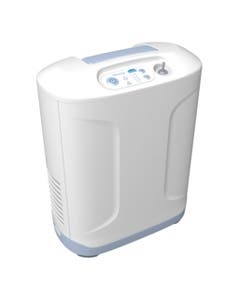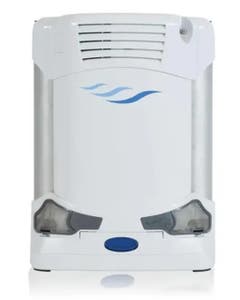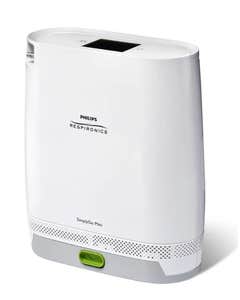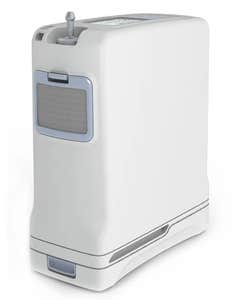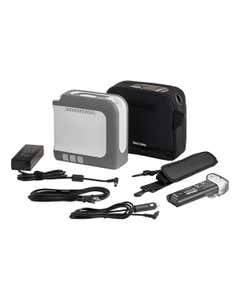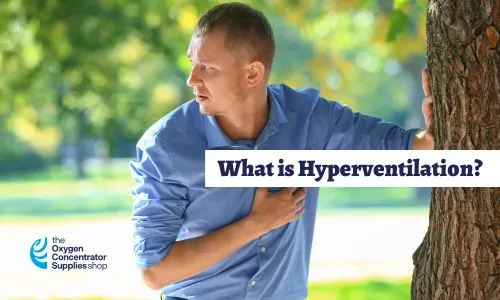
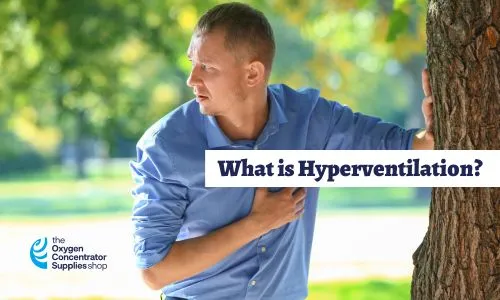
To understand hyperventilation, you need to understand how the respiratory system works. The networks of tissues and organs that make up the respiratory system ensure oxygen delivery throughout the body and waste gases such as carbon dioxide are removed.
Hyperventilation is sudden rapid breathing usually brought on by anxiety or a panic attack. It can make a person feel as though they are not getting enough breath, even though they are breathing too much. Hyperventilation can be more than psychological, affecting the respiratory process and reducing the saturation of oxygen to other parts of the body.
The Physiology of Hyperventilation
Healthy respiratory function is a constant exchange of two gases: oxygen and carbon dioxide. Inhalation draws in oxygen to saturate into the blood and delivers it to all the cells in our body, while carbon dioxide is expelled through exhalation. Both gases are essential for our bodily function and our respiratory system keeps the gases in balance.
Emotional experiences such as panic or anxiety can trigger excessive breathing. Sometimes asthma or other medical conditions can also trigger hyperventilation. Excessive breathing can have the opposite effect, making a person feel as though they are not getting enough oxygen. Often symptoms of hyperventilation are dizziness and shortness of breath which are caused by an imbalance in the normal gas exchange, leading to too little carbon dioxide in the blood.
What Causes Hyperventilation?
Whether the initial cause of a hyperventilation event is emotional or physical, the result is a drop in carbon dioxide in the blood caused by an imbalance in the respiratory gas exchange. Carbon dioxide is essential to the respiratory process, binding to hemoglobin to help produce oxygen. Prolonged hyperventilation can lead to serious consequences, including an increased risk for stroke.
Common Signs and Symptoms of Acute Hyperventilation Syndrome
- Rapid Breathing (Tachypnea): the feeling that you need more breath increases the rate of your breathing.
- Shortness of Breath: you feel as though you are not getting enough oxygen.
- Dizziness and Lightheadedness: low CO2 leads to feelings of dizziness.
- Tingling or Numbness in Extremities: as blood vessels narrow, your fingers and toes may tingle with reduced circulation.
- Chest Tightness: your chest muscles spasm from the respiratory gas imbalance.
- Palpitations: your heart beats faster to drive oxygen flow.
- Anxiety or Panic: the initial emotional reaction that caused the hyperventilation event worsens with symptoms.
- Fainting or Near-Fainting: reduced carbon dioxide may eventually lead to fainting.
What Happens When You Hyperventilate?
Most hyperventilation events are non-life threatening and short. But prolonged hyperventilation can be harmful to your health. If you have frequent hyperventilation events and lasting hyperventilation symptoms, then you need to speak to a doctor.
Oxygen Concentrators as a Supportive Aid
Oxygen concentrators are a form of supplemental oxygen that can help in frequent cases of hyperventilation. Unlike oxygen tanks, oxygen concentrators use the surrounding air to generate pure oxygen. They are essential for supplying respiratory illness patients with a reliable source of oxygen when at home.
Oxygen concentrators use a compressor to draw in air from their surroundings. A filter then separates oxygen from nitrogen and channels the oxygen to the patient through a nasal cannula or mask. Patients who require purer oxygen use oxygen concentrators for managing illnesses such as asthma and COPD.
Oxygen concentrators can also serve to re-balance the respiratory process during a hyperventilation event. By balancing carbon dioxide and oxygen in blood oxygen levels, oxygen concentrators can reduce the duration of hyperventilation events and curb symptoms.
Case Studies and Research Findings
While hyperventilation increases blood oxygen levels, prolonged hyperventilation can rob bodily tissues of critical oxygen. Studies have shown that hyperventilation in especially critically ill patients reduces the oxygen flow to peripheral tissues in the body. 1 For critical care patients, it is necessary to pay attention to the influence of hyperventilation and its effect on their oxygen levels and consumption.
How to Stop Hyperventilating

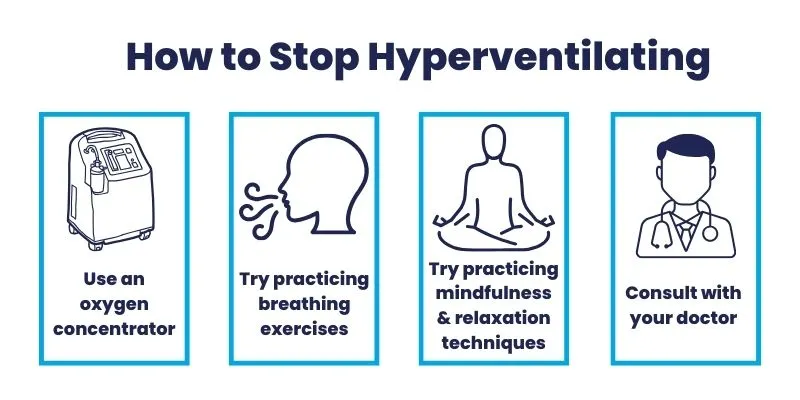
- Use an oxygen concentrator: An oxygen concentrator is one of the main ways you can help stop a hyperventilation event.
- Practice breathing exercises: For those experiencing frequent events, breathing exercises can help control and normalize breathing patterns, and reduce the event's impact. Try to breathe through pursed lips or pinch one nostril or try breathing through your nose. This technique reduces the rapid flow of air. Try to slow your breathing by counting your breaths, thus regulating your breathing rate until symptoms subside. If you experience frequent hyperventilation events it is important to practice your breathing techniques to prepare for when they happen.
- Practice mindfulness and other relaxation techniques: Mindfulness and relaxation techniques commonly used in meditation can also help alleviate anxiety and panic that can trigger and escalate hyperventilation. Calming visualizations, sitting calmly, and relaxing muscles are ways to stop hyperventilation before it starts. Often the symptoms of hyperventilation can increase panic in an individual. Taking psychological control of the situation and de-escalating to a peaceful state of mind is often the best way to prevent hyperventilation from getting worse.
- Consult with your doctor: If hyperventilation events persist, speak to your doctor about using an oxygen concentrator to help manage the incidents. Along with relaxation and breathing techniques, keeping an oxygen concentrator available can also help you manage symptoms, level breathing patterns, and restore calmness.
Conclusion
Understanding hyperventilation is the first step to preventing it. Most events are triggered by anxiety or panic. Know that frequent hyperventilation events can be harmful and should be taken seriously as they leave your respiratory system unbalanced and can result in a deprived oxygen supply to the rest of your body.
Along with breathing exercises and relaxation techniques, supplemental oxygen through an oxygen concentrator may be helpful in managing your symptoms. Be sure to speak to your doctor about an oxygen concentrator for hyperventilation. If you are in need of an oxygen concentrator, let The Oxygen Concentrator Supplies Shop help! We stock best-selling and top-quality ocygen concentrators from well-known brands like Inogen, DeVilbiss, Caire, and more. Give our expert staff a call at 888-941-1688 for assistance today!
References
- Yuankai Zhou, Huaiwu He, Na Cui, Hao Wang, Xiang Zhou, Yun Long, 2021. National Library of Medicine. Acute hyperventilation increases oxygen consumption and decreases peripheral tissue perfusion in critically ill patients



